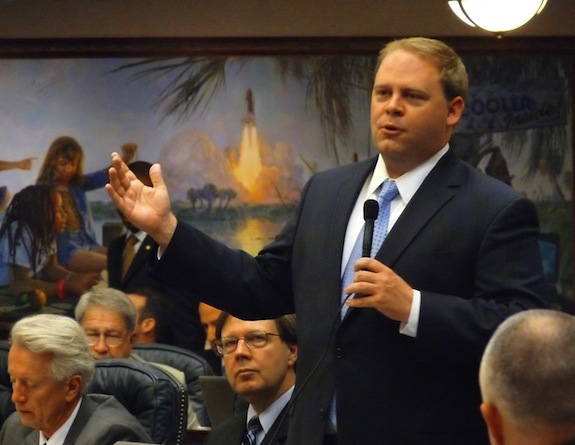
Last week was a bad one for state Rep. Chris Dorworth. He lost his reelection bid and voters rejected an amendment he sponsored. (Photo from myfloridahouse.gov)
By Ashley Lopez
Florida Center for Investigative Reporting
State Rep. Chris Dorworth, R-Lake Mary, lost his re-election last week by a razor-thin margin to his Democratic challenger, Mike Clelland.
Dorworth was slated to become the next speaker of the Florida House, but is now going to be replaced by Rep. Steve Crisafulli, R-Merritt Island.
The Palm Beach Post reports:
The announcement that the Republican caucus had rallied around Crisafulli coincided with the completion of a manual recount in Seminole County that showed state Rep. Chris Dorworth, R-Lake Mary, had been defeated by Democrat Mike Clelland by the margin of 146 votes.
Dorworth, who was speaker-designate for 2014, had raised more than $500,000 for his re-election campaign, vastly outspending Clelland. Dorworth, though, has been plagued by personal financial problems and Clelland, a lawyer and former firefighter, was helped in Tuesday’s election by a strong Democratic turnout in Central Florida for President Barack Obama.
Dorworth is the first incumbent tapped as a future speaker to lose re-election in Florida since 1988, when Democrat Sam Bell was upended after leading the charge for the state services tax a year earlier.
Dorworth was one of the most effective fundraisers in the Florida House. He had been very successful — especially as of late — in collecting checks for his $1 million political fund.
Despite his political fundraising success, the Tampa Bay Times/Miami Herald reported that Dorworth has struggled with his personal finances.
According to the Times/Herald, “Dorworth reported earning $186,000 last year as a business consultant, but listed losses of $235,000 on two business projects.”
Dorworth told the papers that bad real estate investments in Florida’s tough housing market were to blame.
However, Dorworth could have been helped by Amendment 4 — an amendment he sponsored — which was aimed at making buying a house in Florida more attractive by cutting property taxes for many property owners who currently weren’t receiving tax breaks.
The amendment was touted by a well-funded political campaign paid for by real estate agents in the state. It failed, though, along with seven other constitutional amendments on this year’s ballot.
